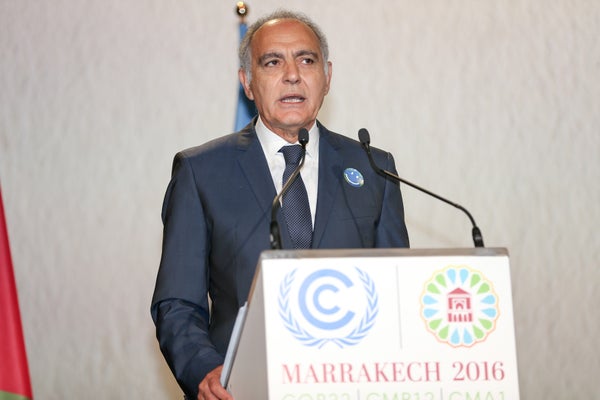The U.S. elected Donald Trump president just two days after United Nations climate talks began in Marrakech, Morocco—a conference meant to turn the December 2015 Paris climate agreement into national action plans. The election results stunned negotiators, and raised questions for everyone at the two-week conference about what a Trump administration means for the agreement, which entered into legal force last week. Still, observers at the 22nd Conference of Parties (COP 22) say the international community remains strongly committed to fighting climate change—with or without Trump’s cooperation.
Many of the representatives at COP 22 are worried about a Trump presidency because he has called climate change a “hoax,” pledged to “cancel” the Paris agreement, repeal many of Pres. Barack Obama’s climate initiatives and has promised to revive the U.S. coal industry. Because the U.S. is the second-largest emitter of greenhouse gases, pulling out of the Paris agreement would be a huge blow to international efforts to limit global warming.
Like many others around the world, COP 22 participants are trying to grasp the repercussions of Trump’s election. “Everyone’s first reaction was shock,” says Jake Schmidt, international program director at the Natural Resources Defense Council, who is currently attending the U.N. conference in Marrakech. “People are sleepwalking a bit, asking themselves, ‘Is this real? Did this just happen? How do we move forward?’ It was a 180-degree turn from what people expected, so everyone’s still digesting it.”
On supporting science journalism
If you're enjoying this article, consider supporting our award-winning journalism by subscribing. By purchasing a subscription you are helping to ensure the future of impactful stories about the discoveries and ideas shaping our world today.
If Trump were to withdraw the U.S. from the Paris agreement, it would take four years for that process to happen, according to the way the agreement is structured. Yet the accord is not designed to punish a country if it does not meet its greenhouse gas reduction targets. So even if Trump did not formally withdraw from the agreement, he could just defy its mandate. Trump could also leave the U.N. Framework Convention on Climate Change, in which it would only take one year to remove the U.S. from the Paris accord.
The U.S. also had pledged $3 billion to the U.N. Green Climate Fund, which gives financial support to developing countries to help them mitigate and adapt to climate change; Trump could renege on that much needed financial support. But world leaders and experts say either move would not come without consequences. “The administration will come to realize that climate action is now a core part of U.S. international diplomacy,” wrote Andrew Steer, head of the World Resources Institute, in a statement yesterday. “The country has committed to the Paris agreement and moving forward with this global pact is critical to preserve America’s trust and credibility in the world.”
Despite the election results, talks at COP 22 are moving forward. “The reality is that people are going to their sessions, events are still happening—the machine didn’t stop here,” says Mariana Panuncio-Feldman, World Wildlife Fund's senior director of international climate cooperation and head of the WWF's delegation at COP 22. “There's a sense that we need to forge ahead, that we need to keep working.” Yet the U.S. election has had an impact. “Obviously, the tone and tenor has changed,” Schmidt says. “If the election had gone the other way, the questions at COP 22 would be, ‘What's next?’ And now it’s more, ‘How do we rally around this global agreement and make sure it’s not undercut?’”
Of course, what Trump said on the campaign trail may not turn out to be what he does in the White House. Observers are waiting to see what he puts on his agenda, who he chooses to be part of his administration and what his specific plans are for climate change. “There’s a big difference between a statement and governance,” says Panuncio-Feldman. “It’s not yet clear how the Trump administration will prioritize climate change.”
Other countries like China and India are prioritizing it, because they see climate action not only as a moral imperative but an economic and social one. “We’re likely to see continued domestic action by key countries to build this clean-energy economy,” Schmidt says. “Their citizens are demanding these actions happen. It’s in their own self-interest.”
If countries do not invest in clean energy and make efforts to mitigate and adapt to climate change, it could hurt them. Or they could at least miss out on economic opportunities—one argument to persuade Trump to cooperate internationally. “This is too logical a transition for anyone to have an ideological argument against clean energy, because it stands against economic growth and good business sense,” says Daniel Kammen, professor of energy at the University of California, Berkeley, and science envoy for the U.S. State Department, who is attending the talks, “That's what people are saying here—they’re incredulous that anyone would want to back off on this.”
